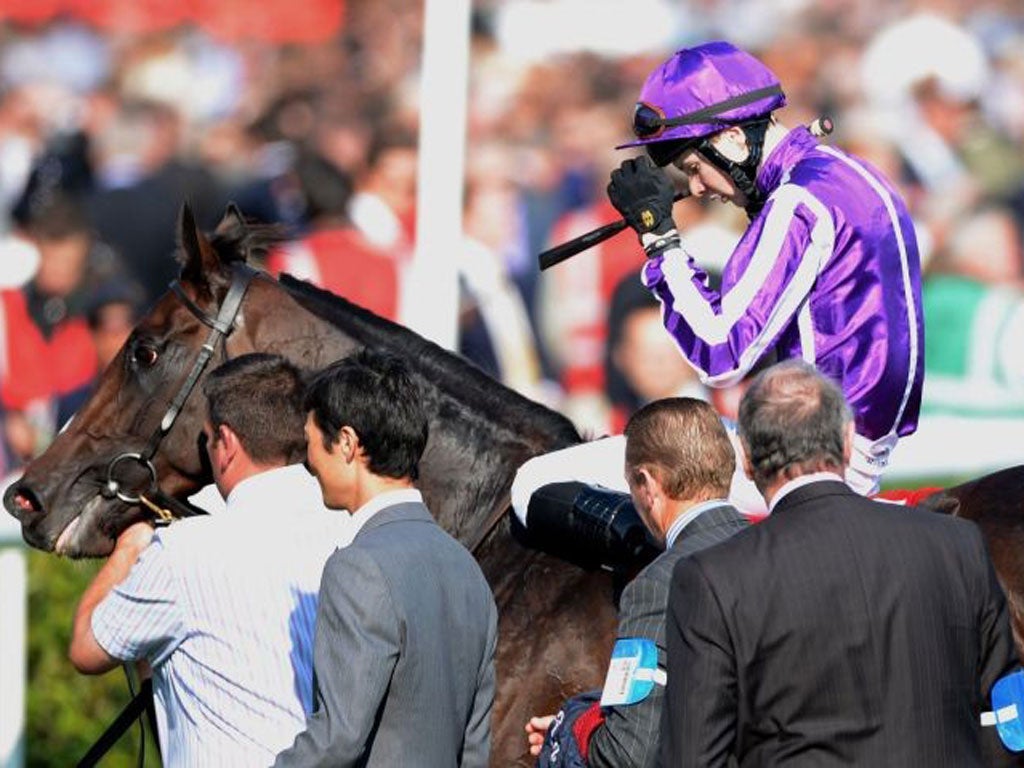Barzalona takes chance to earn Godolphin gratitude
Young jockeys' St Leger duel leaves O'Brien eclipsed as Camelot is denied the Crown

If his immediate, instinctive assessment did not seem especially cogent, Aidan O'Brien could scarcely have invited more admiration had Camelot duly become the first Triple Crown winner since 1970. For it was no less characteristic of the Ballydoyle trainer to submit so patiently to serial inquisitions, just minutes after his champion's first defeat, than to claim all responsibility himself.
Yet if some perceived O'Brien's first priority as the exculpation of his son, who had hung his head in despair as Camelot passed the line three-quarters of a length behind Encke, then every neutral witness will surely attribute the outcome of the Ladbrokes St Leger to the tactics of a rider whose experience is not yet commensurate with his talent. Only the jockey in question was not Joseph O'Brien, but Mickael Barzalona.
The hot favourite's defeat at Doncaster on Saturday was not down to a poor ride, but to an inspired one. There was predictable criticism of young O'Brien, on the basis that Camelot appeared to be closing down Encke late, after being ridden with precisely the patience that had secured the first two legs of the Triple Crown, in the 2,000 Guineas and Derby. But the reality is that Encke was fading in front, his reserves exhausted by the opportunism with which Barzalona had suddenly broken clear of the field.
Relative to Michelangelo in third, Camelot himself was more or less treading water. He seemed to exude discomfort – either with the unsparing demands of the race or, conceivably, some latent issue. There were certainly those who felt this physical paragon was never travelling with his habitual felicity. Even so, those who abjured the Triple Crown three years ago with Sea The Stars – only the second colt eligible for the distinction since Nijinsky – may well congratulate themselves for preserving his own kernel of brilliance against such excoriation.
Nijinsky himself was beaten in the Arc, after a superficially effortless success on Town Moor, and who can say whether Sea The Stars could still have won in Paris, had he come here first? Either way, it is hard to believe that the humbling of Camelot will be forgotten in the unlikely event that another colt qualifies for this historic challenge any time soon.
It is important, with that in mind, to reiterate the sport's debt to John Magnier and his partners at Coolmore, who invested their huge influence on the bloodstock market in the renewal of versatility and stamina as commercial assets. This latest chapter in the history of the oldest Classic was no anti-climax – as, say, when Shergar trailed in fourth in 1981. At the same time, Magnier and O'Brien are palpably at a crossroads with Camelot. Unless they keep him in training, or at least give him another race this autumn, then their awestruck testimonies to his ability will never have been credibly measured in public. He towered above a mediocre crop of contemporaries at Newmarket and Epsom, but has yet to meet an older horse of any kind – never mind the epoch-making one named Frankel – and has followed a much lighter schedule than Sea The Stars or Nijinsky.
O'Brien deplored his departure from his usual practice, in failing to run a pacemaker, suggesting that Camelot had raced too freely as a result – and so, in turn, had less in reserve for the uncharted 572 yards at the end of the race. But the colt essentially seemed to settle well, far better than one or two others in the field, and was last to come off the bridle. As soon as he had done so, however, an awkward tilt could be perceived in head and tail.
Certainly, the pace was far more earnest than when Encke had finished only third in his trial at York. That proved such a pointless exercise that he was recommended as value to reverse that form, and he must be acknowledged as precious vindication for Godolphin's radical restructuring of both riding and training personnel. This was only Encke's sixth race, including two maidens and a handicap, but his improvement for Mahmood Al Zarooni has now been harnessed by Barzalona to add another landmark success to the Derby, last year, and the Dubai World Cup, immediately after his recruitment by Godolphin.
It was made clear throughout that Barzalona would be no mere understudy to Frankie Dettori, whose seniority would not entitle him to break up a winning partnership. True, the heir apparent did seem to be given parity with Dettori far too soon – most notably when chosen to ride Godolphin's last remaining Derby candidate in his trial. And the one thing the stable really needs is the breadth of equine talent to keep both happy, not to mention Silvestre de Sousa. But if he has struggled to match Magnier in recent years, the identity of the winning jockey and trainer will give Sheikh Mohammed nearly as much satisfaction as that of the beaten favourite.
Subscribe to Independent Premium to bookmark this article
Want to bookmark your favourite articles and stories to read or reference later? Start your Independent Premium subscription today.

Join our commenting forum
Join thought-provoking conversations, follow other Independent readers and see their replies